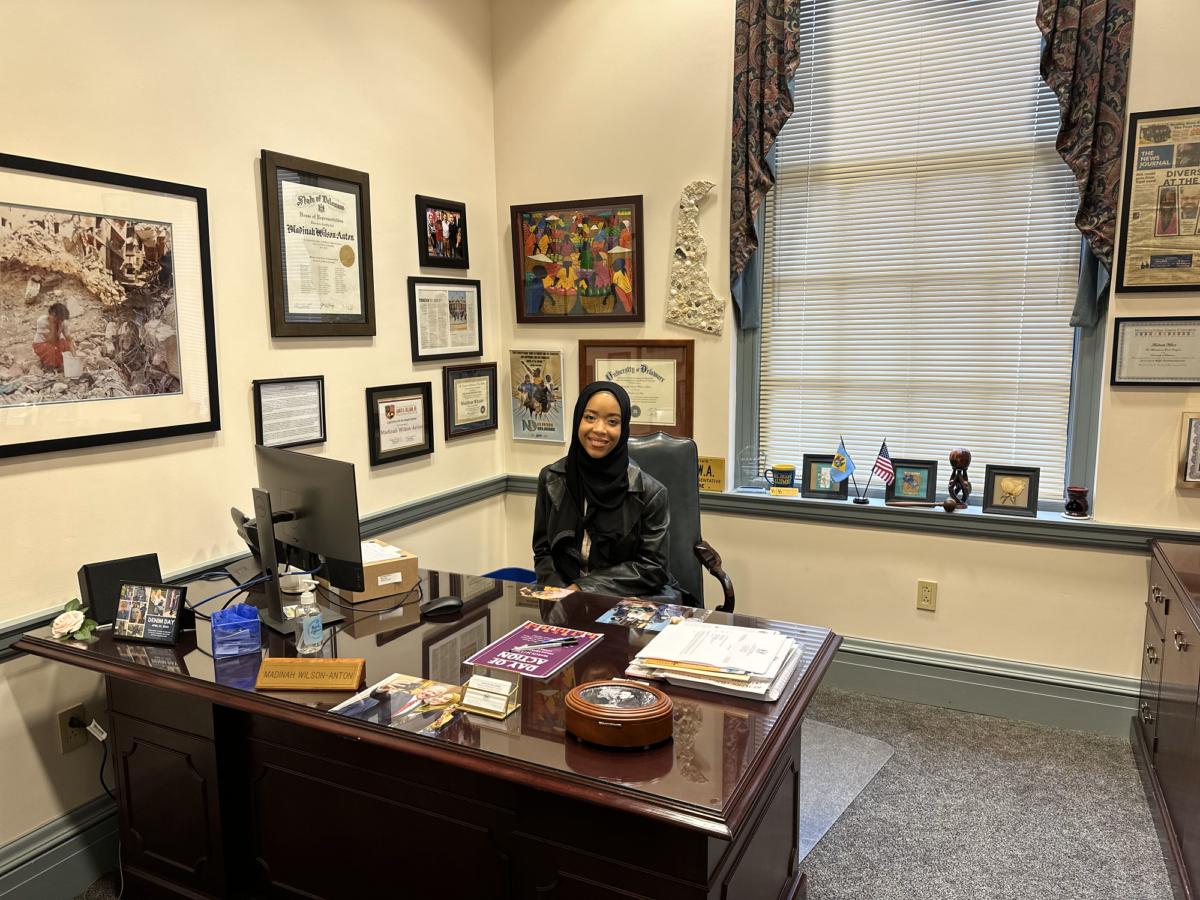This is the first story in what I hope becomes a series. The goal is to eliminate the barrier everyday people face when running for political office. Whether senator or school board member, I encourage you to reach out and tell me why you chose public service so I can share your story with our readers.
I was excited to spend a day at Legislative Hall in Dover shadowing state Rep. Madinah Wilson-Anton on the first Tuesday in May 2023. Wilson-Anton solidified her reputation as a people’s advocate during the 2022 election cycle when she confronted Reybold Group manager Jerry Heisler about displacement of families from the Reybold-owned Timberlane manufactured housing community.
Heisler is an executive at the Reybold firm, located in her district, and regularly represents Reybold’s interests in Dover. After a well documented Legislative Hall confrontation in which Wilson-Anton stood by displaced families and rebuked Heisler’s persistent hounding, signs were plastered throughout her district during her primary campaign clamoring for an apology.
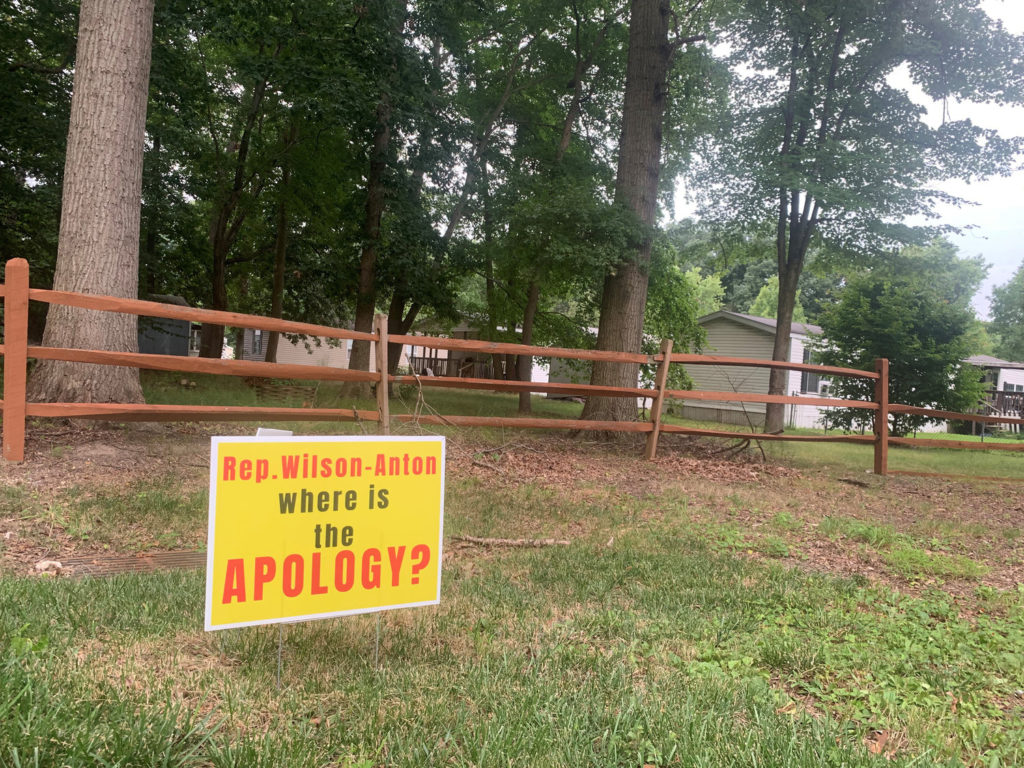
Madinah won her primary by over 30 points.
I asked what moved her to first run for office in 2020. At 29 years old, she’s young relative to many legislators in the General Assembly and sticks out visually. She proudly wears a hijab as part the expression of her Muslim faith. She also lives with vitiligo, an autoimmune disease that gradually removes pigmentation from skin. It can be intimidating to join a group of people where collaboration is so important and be judged by the way you look before a conversation even begins.
Wilson-Anton, though, doesn’t dwell on the challenges.
“I worked down here when I was a student. I studied international relations at UD,” she told me. “I got an email one day about a paid internship working at the state House, and my ears perked up.” At a time when wages were low and professional internships often unpaid, this was a fortuitous opportunity.
After obtaining her undergraduate degree in 2016, she worked for the House Democrats and then for the Senate Democrats in 2017. In 2018 she began a full time job as a legistlative aide back in the state House.
One of her top priorities in office has been housing, and manufactured housing communities specifically, as there are many such neighborhoods in her district.
“I had a bill pass last year that expanded the definition of manufactured housing to include some folks that were kind of falling [through] the gaps. Since then, [manufactured housing residents] have been able to take advantage of the relocation trust fund money, so they can relocate… when they’re forced to leave where they’re living.”
After we met in the morning, Wilson-Anton guided me into her office and I listened in as her aide, Michael Smith, reviewed her schedule for the day.
Our General Assembly is a citizen-run, part-time legislature which is only in session January through June. While aides are full-time, a limited number of staff means most aides work for multiple legislators at once.
As Smith reviewed the schedule, I looked around the office filled with artwork and mementos. There was hardly an empty spot on the walls or shelves. A Cassian Andor bobble-head – still in the box unopened, of course. Awards from University of Delaware, Greek organizations, fellows programs, and even a Delaware Senate tribute from her work in 2017 adorn the walls. A photo of Wilson-Anton and President Biden features prominently on her desk, next to one of her and her husband, Isaiah.
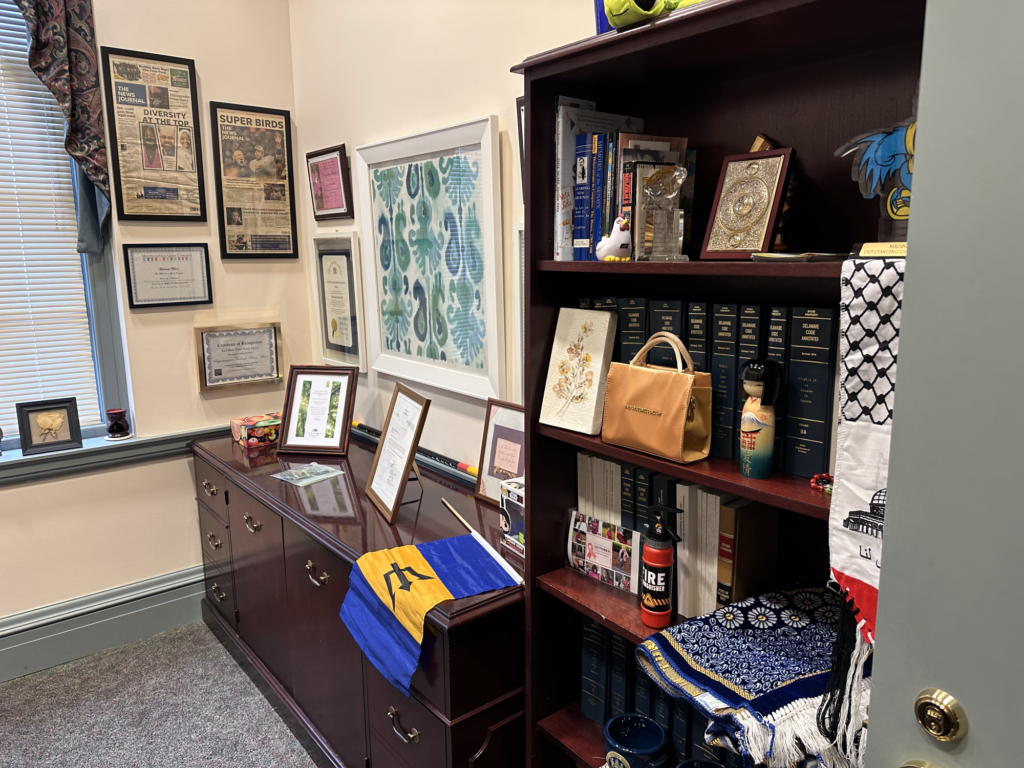
Today, she is scheduled for a morning of committee hearings along with a press conference to squeeze in before a meeting that had been requested by an advocate for a national initiative holding polluting companies accountable. And finally full session of business on the House floor.
We zip off to the first committee hearing. Wilson-Anton gives me a rundown of all the essential people in the room who often work behind the scenes — a schedule coordinator for committee rooms, someone who runs the phone line managing public comment, and a lawyer or policy director who can give advice as needed regarding language of the bills.
Bill sponsors will usually arrange an expert to give hearing testimony – someone with specific knowledge of the bill’s details and an understanding of its need. Subject matter experts that are scheduled to give testimony at legislative committees take time from day jobs to attend these hearings. However, the agendas are often over-booked and present challenges for those wanting to share their expertise in a public forum.
Last legislative session, Wilson-Anton introduced a Green Amendment bill. At that hearing, after comment was extended for state agencies, the allotted time for community and expert comment was suspended and the hearing was carried over until the following day. Unfortunately the expert witness was unable to change her schedule with only a few hours notice, further hampering the bill’s progression.
The Green Amendment came up in our conversations when I asked Wilson-Anton about her priorities for this legislative session.
“It’s a constitutional amendment,” she explained, “so it has to pass two consecutive sessions.” That means it has to pass in this current 2022-2024 session, and then would need to pass again in the 2024-2026 session.
Wilson-Anton is also working on a property tax reassessment bill which was prioritized after a court decision related to education funding equity. Property tax reassessment “hadn’t happened in any of the counties in decades, and it was found to be a contributing factor to the inequities in how we fund our schools,” she told me. Her goal, she continued, is to get each county to reassess property values every five years. “That way we don’t end up in this position again 30 years from now.”
She introduced a bill last session on this topic, and while it was voted out of committee, it never made it to the floor of the House for discussion. The Speaker of the House controls which bills approved by committees make it to the House floor for a full vote.
At the time of our conversation, her proposed bill, HB62, was scheduled for a committee hearing. Since then, it has been voted out of committee with unanimous bipartisan support, was passed on the House floor, and had moved to the Senate’s Housing and Land Use Committee.
“Housing rights has been a theme of the past year,” Wilson-Anton continued. “I’m hoping the tenants’ [right to] council gets through.”
Demonstrating her aggressive portfolio, Madinah has also introduced Civil Rights legislation. “I also have a civil rights bill that has to do with emerging technologies, like reverse warrants and keyword searches, so we’ll see how that goes. I think it should be a pretty easy one, but sometimes,” she laughed, “the ones you think are easy are actually not.” Near the end of the day, that bill – HB145 – was assigned to the Public Safety & Homeland Security Committee in the House.
We ducked out of the committee meeting after Wilson-Anton’s agenda items were complete and quickly headed to the main House floor, where a press conference for this session’s slate of climate change bills was in progress. Madinah arrived in time for Majority Leader Valerie Longhurst to recognize her part in the larger effort to introduce climate change legislation.
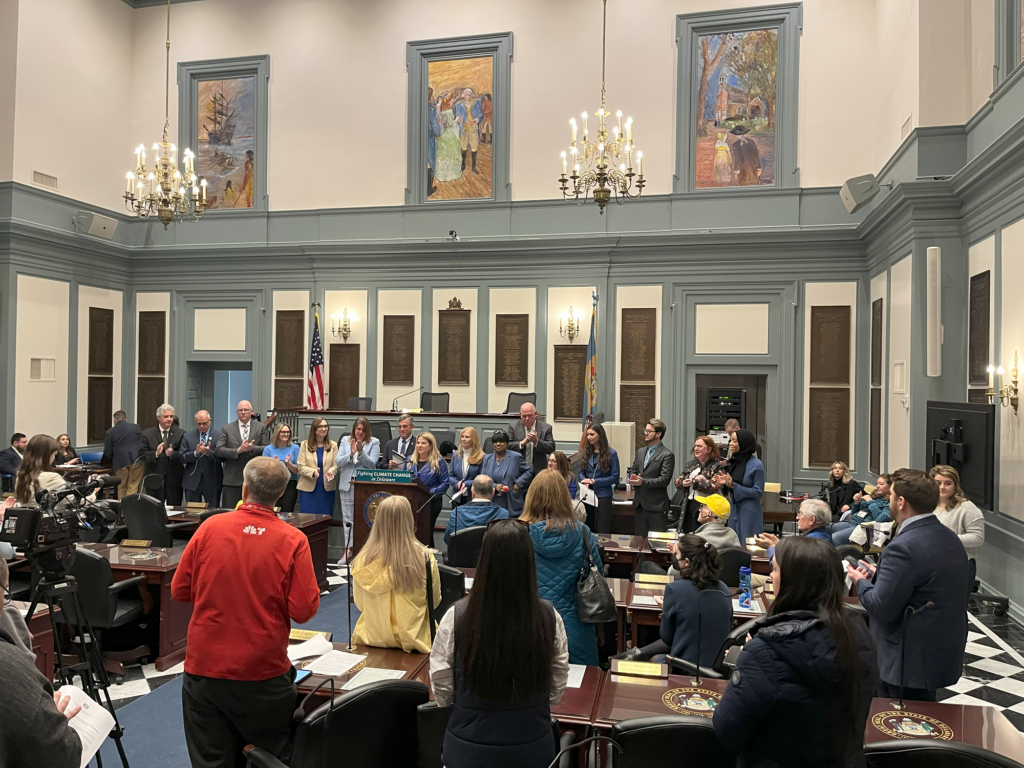
As we navigated the hallways between committee hearings, Wilson-Anton showed the dynamic personality that contributed to her overwhelming win in the last primary. “You’re looking great today!” she said to one colleague who exited the “bull pen” – a collection of offices around a central area. Out in the hallway, she exchanged smiles and pleasantries with at least one person in every group we passed.
An older gentleman wearing a Vietnam Veterans cap stopped briefly to chat about issues he was invested in. He is a manufactured housing advocate, Wilson-Anton informed me afterwards, so they talk often.
During a short lunch break, we grabbed food from the cafeteria downstairs. I was duly impressed by the quality, as the greens and yellow rice were certifiably delicious. “I normally eat in my office,” Madinah said, “but I got fish,” she chuckled knowingly.
Our meal was briefly interrupted so she could again share a compliment with another Representative walking through the cafeteria. “I love that color! Wow, you look like a million bucks.”
I asked her if any examples stick out from her early days interning in the state legislature the made clear General Assembly’s impact on regular families.
“One that comes to mind was when I was – I think I was working as an aide full time – and a bunch of advocates came down, including [now state Senator] Tizzy Lockman, who was an advocate for education equity at the time. And a bunch of family members and community members came down to talk about how we fund our schools.”
“That was kind of the ‘aha’ moment for me, where I realized, ‘Oh, the reason why we didn’t have enough resources in my middle school classroom was because of the referendum process, which is because of state policies and how we fund our schools.’ And I was talking to a [General Assembly] member at the time who said, ‘Oh yeah, that bill’s not gonna pass.’ He basically said, ‘There’s not a political will to make that happen, it’s too controversial, too, whatever.’ And he said it really nonchalant, and it made me so angry.”
“After I left that position,” she continued, “there were rumors that the [Representative] where I lived was going to be retiring, and I had worked for him so I was pretty familiar with the issues of the district from dealing with phone calls with constituents. I also grew up in the district. So [someone said] oh you should think about running. And I did.”
“So what do you do on your non-Dover days?” I asked.
“Yesterday I went to the White House!” Wilson-Anton excitedly replied.
“That’s a little out of the ordinary,” I laughed. “What were you doing at the White House?”
“Ramadan ended about a week and a half ago, so this was the annual White House Eid party.” The White House invited Muslim legislators and officials from across the country, so, she explained, it was a fun opportunity to meet people in person who she had already connected with virtually.
Running through the rest of the week’s plans, she shared, “Oh I’m actually going to be performing in a comedy show [Friday] evening. So I’ll probably spend the time between Friday prayer and the show freaking out and wondering why I’m doing this and why I think I’m funny.”
As we wrapped up our meals, a downtrodden man walked past our chairs. “Hey Mark, how you been?” she called out.
“Alright,” came the morose reply, with a heavy sigh.
“You convinced me!” I called after him, eliciting a small, somewhat begrudging, chuckle.
After lunch, we were scheduled for a Natural Resources Committee hearing. Wilson-Anton is an avid multi-tasker during meetings. State representatives have a duty to serve their constituents, and she takes this role seriously. She uses any break in discussion, or long-winded diatribe, to respond to requests for help or input from constituents in her district.
She takes an “every day, all the time” approach to responding to her constituents’ questions and requests for help. “I get tons of emails,” she explained to me. Her aide handles most of the phone calls, and will text her for input when necessary. “This Wednesday,” she continued, “I have a community meeting. So you know, some neighborhoods have HOAs (Home Owners’ Associations), some have maintenance corporations. Some meet every month, some meet once a year, so that part is kind of sporadic. But I tend to have those in the evenings and then community events.” The events a Representative might be invited to range from library events to graduations to festivals to ribbon cuttings.
“I think about that,” I noted, “Your personal life shrinks quite a lot, or at least the part that you have control over.”
“Especially if you’re not intentional about keeping time for yourself,” Wilson-Anton replied. “People will ask me, ‘How is it running, and what was difficult about it?’ And yeah it was difficult, but you know I am married with no kids so I have the support system without the responsibility.”
I am selfishly interested in this topic, because I am a parent of young children and it is difficult to see how running for office would be possible before my kids are at least in middle school. I asked if there was legislation around allowing candidates to use campaign funds for childcare, which many states have started to do and has helped increase the number of women and parents running for office.
“It’s covered now [in Delaware],” Wilson-Anton informed me. “Representative [Sherae’a] Moore, I believe, ran a bill to do that, my first term.”
Smith had shoe-horned a meeting onto the schedule with Lauren O’Brien, a State Campaign Director for the Center for Climate Integrity. Representative Larry Lambert joined us in Wilson-Anton’s office, and we heard about ongoing lawsuits against large corporations who are responsible for mass amounts of pollution in our world.
A significant part of the his job as an aide is scheduling meetings with climate-friendly legislators across several states. Building awareness of political actions is important, especially when more large-scale support and attention is needed. For now, this meeting’s goal was to keep the Representatives up-to-date.
So much of political movement happens slowly, over time, and we don’t see all the work that goes on behind the scenes until a bill hits the Governor’s desk, or the media tells us about a court case we might have otherwise ignored.
But there are always people doing the work. Everyone has a role to play.
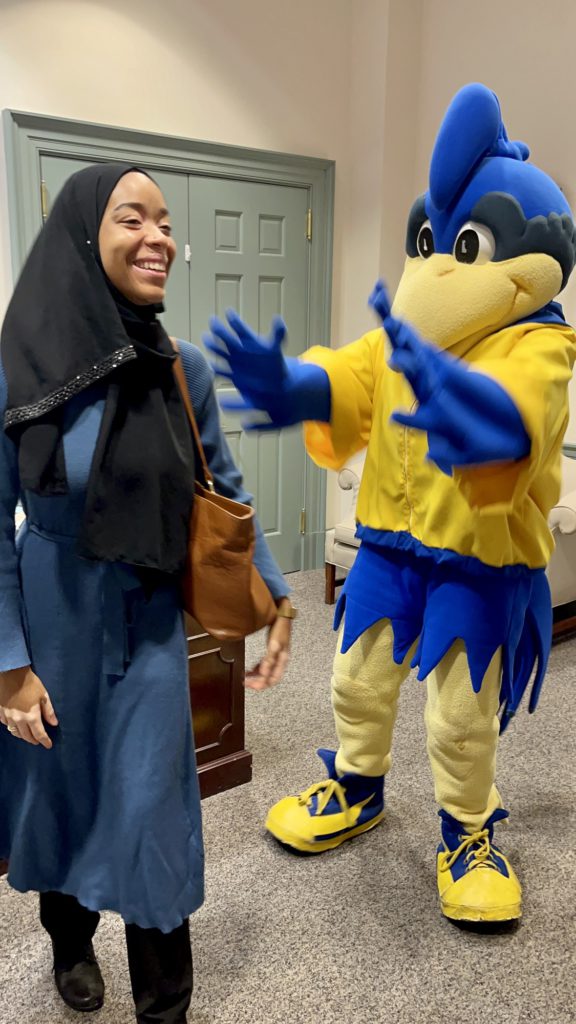
Finally, with my energy flagging, the bell rang to announce the imminent start of the House floor session, the final event of the day.
The session started with a Christian prayer, an odd artifact considering Representatives practice other faiths or none at all. Wilson-Anton herself is the first, and currently only, Muslim legislator in the state of Delaware.
I spent a moment hoping we might one day update our symbolic acts to include all those who represent our state. I recalled one of Wilson-Anton’s bills she had featured on her office wall – the concurrent resolution to recognize the month of Ramadan and those who celebrate it in the state of Delaware.
Representative Eric Morrison recently introduced a concurrent resolution to similarly designate a day recognizing atheists in Delaware, as Morrison adheres to secular values and considers himself an atheist. This resolution was originally defeated, showing there is still progress to be made in recognizing individuals’ rights to freedom of – and from – religion; a second attempt passed.
The session was quite busy to start, as we observed a moment of silence, followed by the Pledge of Allegiance led by children and teachers from a childcare center in one of the Representative’s districts. Official recognition was given to UD athletes and mascot, and other various recognitions to various Representatives. Somewhere in this mayhem, I got kicked out because there weren’t enough extra seats for me on the floor. I took the opportunity to refill my coffee mug in the cafeteria.
We met back in her office during the brief break between the floor session’s introductory ceremonies and the party caucus time. (Both parties have the opportunity to caucus, or meet privately, after the floor session comes to order but before any bills are discussed. These sessions are intensely private, and not even aides are privy to the discussions. If contentious bills are being presented, caucus sessions can go into the evening. Thankfully, I attended on a less controversial day.)
Wilson-Anton took this time for her 3 p.m. prayer. (Islam has five designated prayer times during the day, with special allowances to combine prayers on days of travel; this allowance allows her to combine her afternoon prayers at a time that fits with the back-to-back schedules of a state representative.) Closing the door and grabbing her prayer rug off the bookshelf, she assured me that it was fine for me to stay in the room while she prayed. She quipped that rituals like this are what keep her from yelling during those particularly frustrating interactions.
I did take the opportunity to attend the Friday evening standup comedy competition Madinah had mentioned. Here, too, she stuck out. Of the dozen or so people involved with the show, Madinah was one of only two women. She joked about her vitiligo, and the cost of healthcare. She tried a few jokes that didn’t quite fit the audience, and then joked about them falling a bit flat.
The audience voted her the best standup of the evening, and the theater invited her back to host a June event. I ran into her aide Smith there, too. We survived the awkward cringe during some of the less experienced standup entrants sets, and I cried from laughing at others. When Wilson-Anton got invited back in June, Smith laughed again, saying he knew her schedule better than she did, and that she was definitely not available for that June slot. But I have a sneaking suspicion she’ll find a way to make it happen anyway.
[Ed Note: At the time of publishing, Madinah is listed as one of the features for Theatre N’s June 2nd Let ‘Em Cook comedy show).
During a brief break towards the end of my day in Legislative Hall, I caught up with Wilson-Anton chatting in the hallway with a Government Affairs Specialist from Christiana Care. While I wasn’t sure of the topic being discussed, I also wasn’t surprised by the content of their conversation.
The specialist said, “I don’t want to say there’s no way,” to which Wilson-Anton predictably responded with a smile, “especially to someone like me.”

